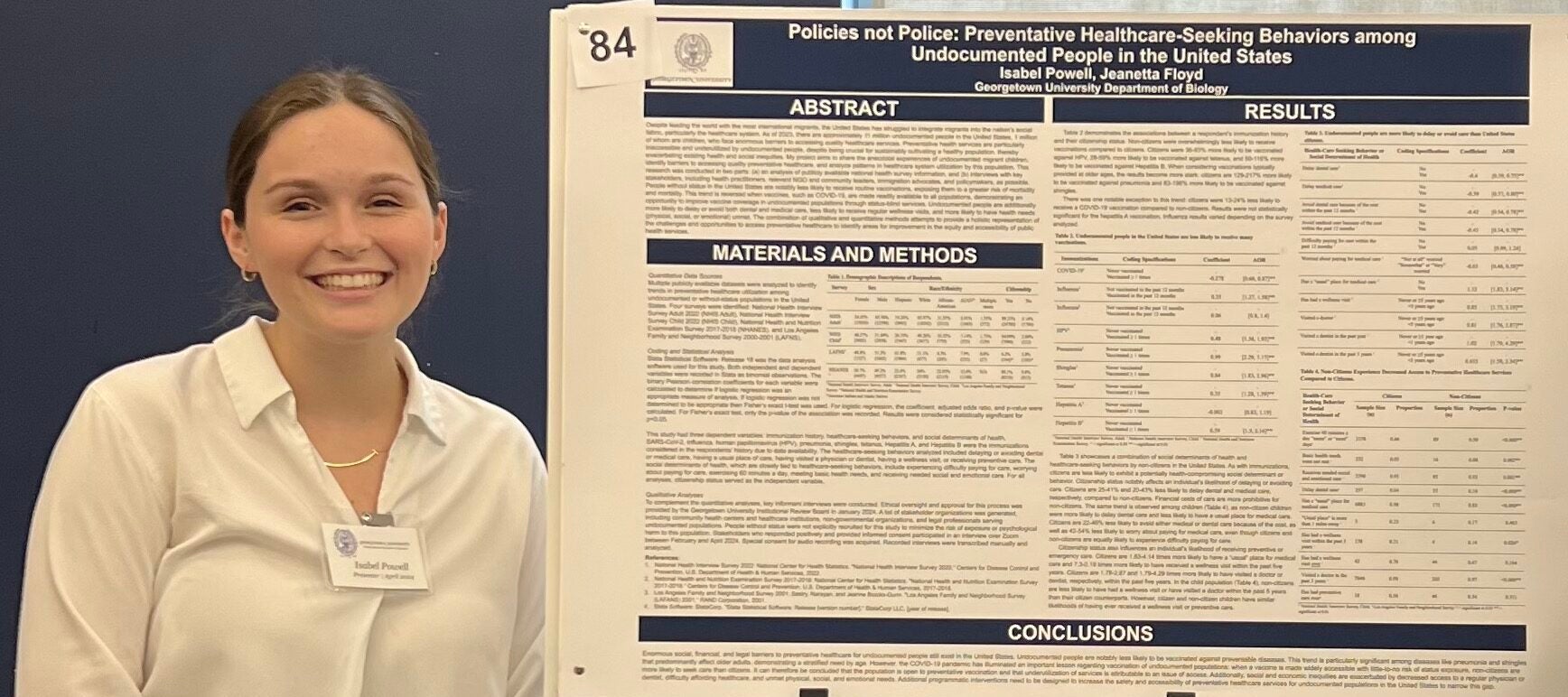Georgetown Biology Graduate Student Tackles Global Health Challenges Through Research
Isabel Powell (C’24) isn’t your typical college graduate. Her time at Georgetown University hasn’t been confined to classrooms, but rather a journey around the world conducting public health research, marrying her passions for science and policy.
Powell, graduating with a major in biology of global health and a minor in justice and peace studies, initially wasn’t sure of her exact path. “I knew I would do something with biology,” she said. “But I also wanted to use that scientific interest to solve real-world problems, problems that directly impact people’s lives.”
A Global Perspective on Public Health
Powell’s academic journey was shaped by research and mentorship that allowed her to bridge the gap between science and social impact.
- Early Research: After her first year, Powell traveled to Boston for a Royden B. Davis Fellowship, investigating cellular indicators in cancer tumors. While intellectually stimulating, she craved research with a more immediate impact on people’s lives.
- Shifting Focus: Back at Georgetown, she worked with Dr. Indira Narayanan on neonatal mortality in Jordan. This experience, focusing on practical solutions and policy changes, resonated deeply with her.
- Global Health Institute: Through the Global Health Institute (GHI), Powell connected with Dr. Samson Haumba, studying barriers to cervical cancer screenings in Eswatini. Here, she explored the social and economic reasons behind low screening rates, highlighting the importance of cultural factors.
- Independent Study: Studying abroad in India, Powell conducted research on HIV and tuberculosis stigma within the Tibetan refugee community. This project explored how cultural stigmas affect healthcare-seeking behaviors and patient well-being.
- Thailand Experience: Powell further honed her skills in Thailand, working with the Research Triangle Institute on USAID’s Health Research Program. There, she helped develop a national strategy for malaria elimination among school children.
Leadership and Mentorship on the Hilltop
Beyond research, Powell was actively involved in the Social Responsibility Network (SRN), a student group fostering interest in service-based careers. As co-chair, she led site visits and connected students with professionals in the field.
“The SRN was a space where we learned from alumni and practitioners, making seemingly impossible careers feel achievable,” Powell said. Her dedication was recognized by Thomas Chiarolanzio, a senior associate dean overseeing the SRN, who praised her as an “inspiration” to other students.
Senior Research Project Close to Home
For her senior research project, Powell investigated preventative healthcare-seeking behaviors and social determinants of health for undocumented people in the United States. inspired by a close family-friend, this project was deeply personal.
“Growing up, someone close to me was undocumented,” Powell said. “Witnessing the challenges she faced accessing healthcare was eye-opening. This project allowed me to use my research skills to advocate for change.”
Recognition and Looking Forward
Powell’s outstanding work was recognized with the Chapman Medal, awarded to the undergraduate student with the most exceptional research project in the Department of Biology. Professor Jeanetta Floyd, who oversaw her project, called Powell “truly exceptional” and highlighted her dedication to impactful global health solutions.
Reflecting on her time at Georgetown, Powell feels immense satisfaction. “When projects are meaningful, they don’t feel like work,” she says. “I was fortunate to always have something that kept me engaged and motivated.”
Powell’s journey exemplifies how Georgetown fosters well-rounded graduates, equipped to tackle global health challenges with not only scientific expertise but also empathy and a dedication to positive change.
